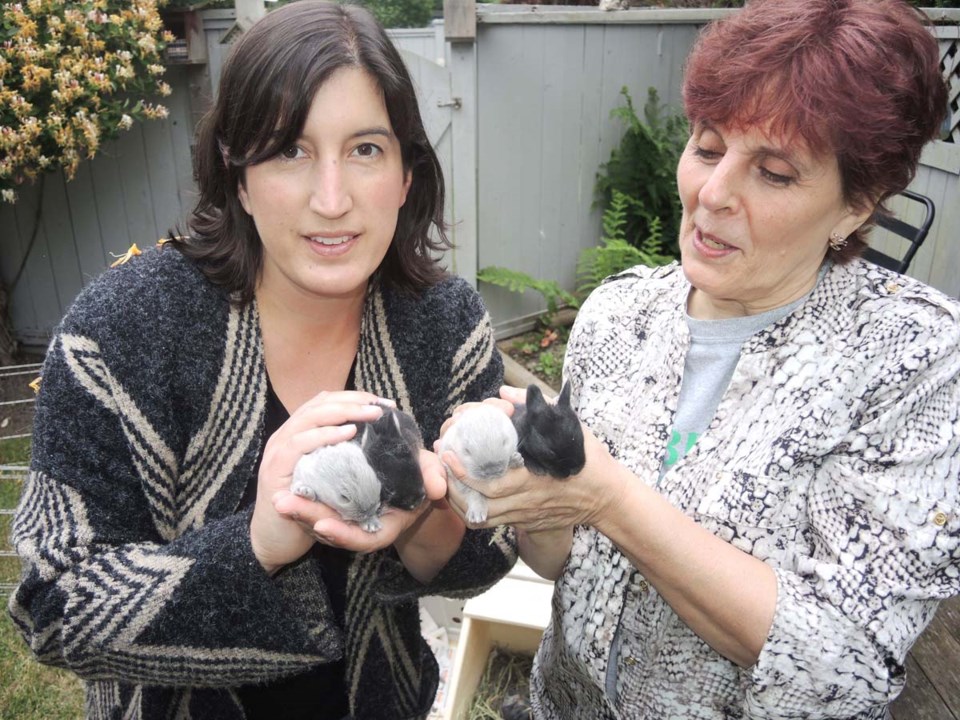No matter how hard she tries, Amie Nowak just can’t seem to crunch the numbers down.
Every time she manages to reduce the number rabbits being temporarily housed in her backyard, more arrive into her makeshift bunny haven on the far west end of Williams Road.
The Richmond News told two weeks ago how mom-of-two Nowak took matters into her own hands to curb the burgeoning rabbit population in her west Richmond townhouse complex.
Local rabbit sanctuaries and the Richmond-based Regional Animal Protection Society (RAPS) – which has the City of Richmond animal shelter contract – cannot, for various reasons, take in any more rabbits.
At one point, Nowak was up to 14 rabbits from the same family, after finding three more in her complex recently.
In the meantime, she has managed to adopt out two from the middle litter and has had some help from neighbours for spaying/neutering costs.
And there are pledges to adopt four of the six babies, when they reach the required eight-weeks-old.
“I’m asking people to have them spayed and neutered when they adopt them,” said Nowak who, along with Richmond rabbit charities, has appealed for the City of Richmond to do more to contain what they call a “bunny boom.”
“I’ll be honest, my priority is getting the rabbits out of my backyard and adopted out.
“I’m trying to adopt them via Rabbitats online adoption form. My preference is not to adopt them out until Rabbitats has looked at the online application.”
In the meantime, however, Nowak is still looking after a plethora of bunnies in her relative small backyard, which now has two large rabbit hutches.
It all started about a month ago, when one of her excited daughters brought home one of the local rabbit family.
“I think the novelty has worn off; there are days when I come home and it’s clear the rabbit haven’t been fed,” added Nowak.
“I guess it’s been a good learning curve in realizing how much care is needed.”
The News told two weeks ago how Nowak and her rabbits got turned away from the city’s contracted animal shelter, RAPS, which had to incinerate its rabbit accommodation after the March outbreak of rabbit hemorrhage disease (RHD).
Due, in part, to RAPS being off-limits, local rabbit charities, Rabbitats and Bandaids for Bunnies, are both full and at financial breaking point.
“I don’t mind spaying or neutering one or two, but I’m not doing all of them,” said Nowak at the time.
“But I really think the city needs to step up. Perhaps with some land to house them and maybe a spaying and neutering program.”
Nowak pointed out that rabbits, over time, do way more damage than cats and dogs — for which there is a city spaying/neutering program — and rabbits “reproduce, like rabbits!”
Nowak still has an Instagram account she has started up - Edgewater_Fluffle – to adopt the rabbits.
Rabbitats talked about Richmond being on the wrong end of a 10-year baby boom where, according to biologists, every decade, the rabbit population explodes.
Asked if it should be doing more to deal with the issue, the city said it was currently monitoring the situation and has been in ongoing discussions with the Ministry of Forests, Lands and Natural Resource Operations and local animal charities.
“Unfortunately, the city is limited in what it can do in the area of rabbits as they are considered Schedule C Wildlife under provincial wildlife legislation,” said the city’s spokesperson, Ted Townsend, in a statement.
“The city can trap, hold, and euthanize rabbits, but not release or make available for adoption. The approach the city has taken is that of educating the public on the release of rabbits into parks and the feeding of rabbits, which are prohibited under civic bylaws.”
Townsend said the city is “currently not resourced to fund the trapping of rabbits and establishing sanctuaries.”

.jpg;w=120;h=80;mode=crop)

